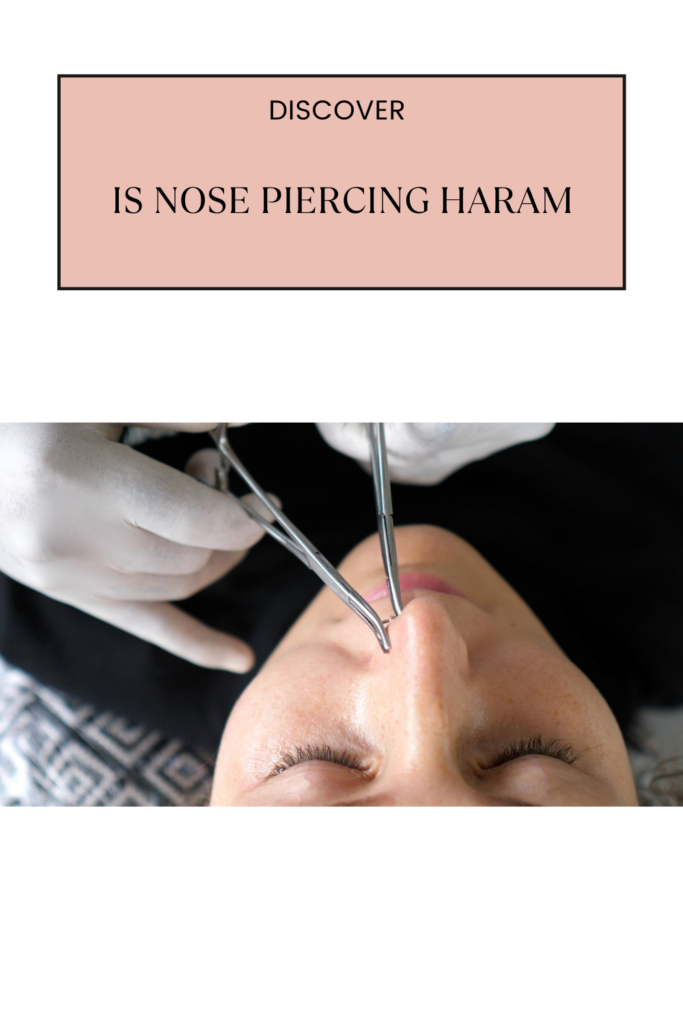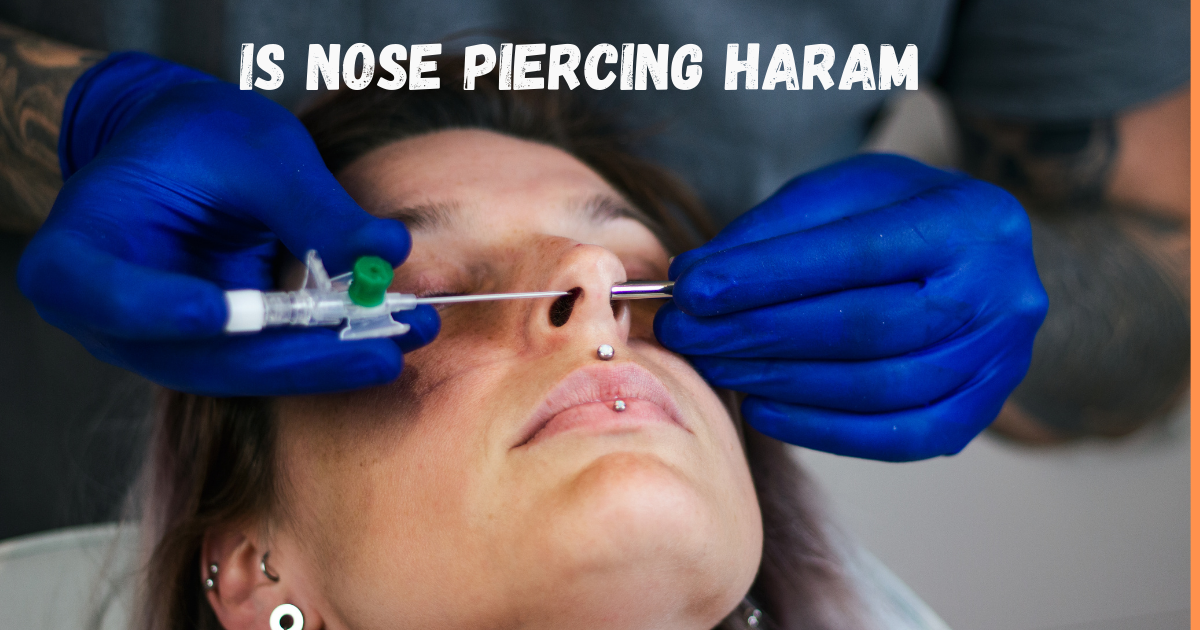Is Nose Piercing Haram?? In the realm of religious practices, Islam holds great significance for its followers. It is not uncommon for individuals to seek clarity on various matters, including the permissibility or prohibition of certain practices.
One such topic that often sparks discussion and curiosity is nose piercing. In this blog post, we delve into the question: Is nose piercing haram in Islam?
By examining the religious perspective, exploring different interpretations, and considering scholarly opinions, we aim to shed light on this intriguing subject. So, let us embark on this journey of understanding and uncovering the truth behind nose piercing in the context of Islam.
Is Nose Piercing Haram In Islam?
Nose piercing in Islam is a subject that has garnered attention and debate among Muslims. While opinions may vary, it is important to understand the religious perspective.
According to Islamic teachings, the permissibility of nose piercing depends on the interpretation of relevant religious texts and the rulings of scholars. Some argue that it is prohibited (haram) due to the potential alteration of one’s natural creation, while others believe it is permissible (halal) under certain conditions.
To gain a comprehensive understanding, let us explore the different viewpoints and considerations surrounding nose piercing in Islam.
Nose Piercing Should Be Right Or Left Side?
The choice of which side to get a nose piercing is a matter of personal preference and cultural traditions, rather than a specific religious requirement in Islam. Islam does not prescribe a specific side for nose piercing.
Therefore, whether you choose the right side or the left side for your nose piercing is entirely up to you and should be based on your own preference and comfort
. It is important to consider any cultural or aesthetic significance attached to one side over the other, but ultimately, the decision rests with the individual.
Is Septum Piercing Haram In Islam?
The permissibility of septum piercing, like nose piercing in general, is a subject of debate among scholars in Islam. While there is no explicit mention in religious texts specifically addressing septum piercing, some scholars consider it permissible (halal) as long as it does not cause harm or lead to any religious violations.
However, other scholars argue that it is prohibited (haram) based on their interpretation of general guidelines regarding altering one’s natural creation.
As with any religious matter, it is advisable to seek guidance from knowledgeable scholars and reflect upon different viewpoints before making a personal decision.
Why Is Nose Piercing Halal?
In Islam, the permissibility (halal) of nose piercing is a topic that has varying opinions among scholars. Those who consider nose-piercing halal argue that there is no explicit prohibition in the religious texts that specifically forbids it.
They believe that as long as the piercing does not cause harm or lead to any religious violations, it is permissible. They also highlight cultural and historical evidence of nose piercing being practiced by some Muslim communities without any religious objection.
However, it’s important to note that the permissibility of nose piercing may differ based on individual interpretations and cultural contexts, and seeking guidance from knowledgeable scholars is recommended to make an informed decision.
Is every piercing haram in Islam?
In Islam, the permissibility (halal) or prohibition (haram) of piercings is a matter of scholarly interpretation and individual judgment.
While some scholars consider certain types of piercings, such as earlobe piercings, to be culturally acceptable and permissible, others may have more restrictive views. The main concern surrounding piercings is the intention behind them and any potential harm or violation they may cause.
It is important to seek knowledge and guidance from qualified scholars who can provide insights based on Islamic teachings and principles. Ultimately, it is up to individuals to make informed decisions, considering both religious guidelines and personal considerations.
Is body piercing haram in Islam?
The permissibility (halal) or prohibition (haram) of body piercing in Islam is a subject of differing opinions among scholars.
While there is no specific prohibition against body piercing mentioned in religious texts, some scholars argue that certain types of body piercings may be considered prohibited due to potential harm, alteration of one’s natural creation, or resemblance to practices associated with non-Islamic faiths.
However, it is important to note that opinions on this matter vary, and there are Muslims who engage in body piercings within certain limits and guidelines. Ultimately, it is advisable to seek guidance from knowledgeable scholars and reflect upon different viewpoints before making a personal decision.
Which Piercings Are Allowed in Islam?
- The permissibility of specific piercings in Islam varies based on the interpretations of scholars and cultural practices.
- Earlobe piercings for both men and women are generally accepted and widely practiced in many Muslim communities.
Which Side of The Nostril Should Women Pierce?
In Islam, there is no specific religious requirement or ruling regarding which side of the nostril women should pierce. The choice of which side to pierce is largely a matter of personal preference and cultural traditions.
Some cultures may have traditional practices or beliefs associated with piercing a specific side, but these are not universally applicable to all Muslim communities.
Therefore, women are free to choose the side of their nostril for piercing based on their own preferences and cultural considerations, without any specific religious obligation.
Are Piercings Considered Haram for Men?
In Islam, the permissibility of piercings for men is a subject of differing opinions among scholars. While some scholars consider certain types of piercings, such as earlobe piercings, to be culturally acceptable and permissible for men, others may have more restrictive views.
The main concern surrounding piercings is the intention behind them and any potential harm or violation they may cause. It is important to seek knowledge and guidance from qualified scholars who can provide insights based on Islamic teachings and principles.
Ultimately, it is up to individuals to make informed decisions, considering both religious guidelines and personal considerations.
Conclusion:
In conclusion, the permissibility of nose piercing in Islam remains a subject of debate and differing opinions among scholars. While some argue that it is prohibited (haram) due to potential alterations of one’s natural creation, others consider it permissible (halal) under certain conditions.
It is important to approach this matter with an open mind, seeking knowledge from knowledgeable scholars and reflecting upon different viewpoints. Ultimately, individuals must make informed decisions based on their understanding of Islamic teachings and their personal beliefs. Respect for cultural traditions and considerations of modesty should also be taken into account.
Regardless of the stance one adopts, it is crucial to approach these discussions with mutual respect and tolerance, recognizing that matters of personal piety and religious practice can vary among individuals
FAQS
Q: Is nose piercing haram in Islam?
The permissibility of nose piercing in Islam is a subject of debate among scholars, with varying opinions on the matter.
Q: Can women choose which side of the nose to pierce?
Yes, there is no specific religious requirement regarding which side of the nostril women should pierce. It is a matter of personal preference and cultural traditions.
Q: Is it a sin to get a nose piercing?
The sinfulness of getting a nose piercing in Islam is subject to varying opinions and interpretations.
Q: Can Muslims have face piercings?
The permissibility of face piercings in Islam is a matter of differing opinions among scholars, with considerations given to cultural practices, potential harm, and adherence to Islamic teachings.
Q: Is it haram to get a Belly piercing in Islam?
The permissibility of belly piercing in Islam is a subject of debate among scholars, with varying opinions on whether it is considered haram or permissible based on individual interpretations of Islamic teachings and cultural considerations.
Q: Is it haram to get a lip piercing in Islam?
Yes, getting a lip piercing is considered forbidden (haram) by some scholars in Islam.
Q: Why do some scholars consider nose-piercing haram?
Some scholars argue that altering one’s natural creation through nose piercing is prohibited based on their interpretation of Islamic teachings.
- “Is Lobster Halal? Understanding Its Permissibility”
- “Is Drawing Haram in Islam? Understanding the Perspective”
- “Is Fermented Kimchi Halal? Exploring Kimchi’s Halal Status”
- “Is Collagen Halal? Unveiling the Halal Status of Collagen”
- “Is Wine Vinegar Halal? Unveiling Its Permissibility”


